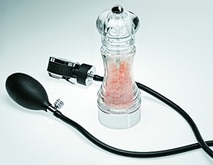
If I had to give top prize to the most dangerous dietary fable out there it would go to the low-salt myth. And it’s like this advice has Velcro attached to it. Because no matter how many times brave researchers tell the real story, the old “salt kills” tune starts playing once again.
This time it’s coming from researchers from several prestigious institutions, and while the media are playing it up to the hilt, one well-known expert is saying “not so fast.” Because where salt is concerned, if you go too low you can be putting your health in serious jeopardy.
‘It doesn’t make any sense’
Dr. Nancy Cook, with Brigham and Women’s Hospital and Harvard Medical School, is giving interviews about her new salt study all over the place. And they basically say the same thing:
Trash your salt shaker and you’ll live longer.
But Dr. Cook’s data, taken from two studies on blood pressure, didn’t look quite right to one expert who has conducted some of the biggest sodium studies to date.
Dr. Andrew Mente, whose research I’ve been telling you about, published a commentary in the same journal as Dr. Cook’s study, saying that her conclusion “doesn’t make any sense.” Dr. Mente, a researcher from McMaster University in Canada, puts it bluntly: “Sodium is an essential nutrient,” he said. “Without sodium, you die.” Also, the way Dr. Cook came up with her remarkable findings that she claims prove a low-sodium diet will “prolong life,” is based on “misleading” statistics, according to Dr. Mente. To understand why Dr. Mente is such a maverick, remember that the mainstream has been dishing out this low-sodium mantra for so long that they will never, ever admit they might be wrong.
Why, the American Heart Association is still saying that we should keep our salt intake below 1,500 mg a day!
But here’s why that advice can be deadly:
Dr. Mente’s study on sodium and high blood pressure found that those with hypertension who consumed under 3,000 mg of salt a day had a giant 34 percent increased risk of having a heart attack or stroke. And for those without high blood pressure, cutting sodium to basement levels, as the AHA recommends, can up your risk of a heart attack or stroke by over 25 percent. Dr. Mente’s study wasn’t one that just looked at just some limited figures, either. He crunched the data on over 133,000 people in 49 different countries.
Other studies that have been coming out for years have all come to similar conclusions. For example research published in the New England Journal of Medicine found that going under 3,000 mg a day can significantly up your risk of a heart attack or stroke. Belgium researchers found that a low-salt diet can raise your likelihood of suffering an early death by 500 percent! And 12 years ago a study out of Germany discovered that seniors are especially harmed by this low-salt nonsense.
But believe me, nothing, and I mean nothing, will stop the attack on salt. Aside from heart attacks and strokes, a salt deficiency can cause plenty of other health problems such as headaches, muscle weakness, fatigue — and even seizures. And if you’re wondering what Dr. Mente believes the optimal amount of salt we should be consuming is, well, it’s probably right where you’re at now — between 3,500 and 4,000 mg a day.
Doctors Cook and Mente do agree on one thing, however. That we should all be active, not smoke and eat our fruits and veggies. But just think how much better those vegetables will taste with some salt on them!
Sources: “Sodium wars: Where some see linear link with all-cause death, others see no need to change western ways” Michael O’Riordan, October 5, 2016, tctmd, tctmd.com
 RSS Feed
RSS Feed